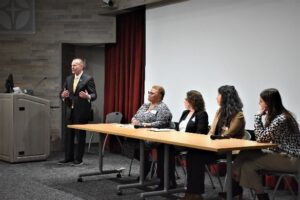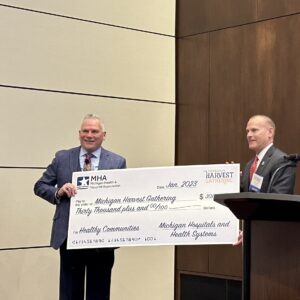

As individuals and families across the state and country continue to face food insecurity, Michigan’s hospitals, health systems and community leaders are engaged in creating collaborative solutions. MHA CEO Brian Peters joined fellow food security champions March 24 at the Come to the Table: Ending Hunger in America by 2030 event, hosted by Trinity Health.
The event, which took place at St. Joseph Mercy in Ypsilanti, gathered representatives from healthcare, agriculture, education, veteran’s affairs, housing and various other sectors to discuss key topics related to food insecurity. Peters kicked off a series of panels moderating a discussion on nutrition insecurity in healthcare. Panelists included:
- Alfreda Rooks, MPA, director of community health services for Michigan Medicine – UM Health.
- Kristen Matlack, community health advocacy initiative manager at MetroHealth System’s Institute for HOPE.
- Lisa McDowell, clinical nutrition and lifestyle medicine at Trinity Health.
- Karlen Sandall, digital health worker manager at OSF Healthcare.
Additional panelists covered hunger across the age spectrum, bridging the gap between hunger and nutrition and ways to take a bipartisan approach to addressing food insecurity. Attendees were given the opportunity to ask questions and exchange ideas in a town hall-style discussion that followed.
The event included virtual remarks from U.S. Senator Debbie Stabenow, chairwoman of the U.S. Senate Committee on Agriculture, Nutrition and Forestry; U.S. Representative Marcy Kaptur; Secretary Vilsack, Department of Agriculture; Secretary Becerra, Department of Health and Human Services.
The gathering concluded with an exclusive tour of The Farm at Trinity Health Ann Arbor, one of Michigan’s oldest hospital-based farms in the country. The five-acre space, which includes a hub for growing and distributing food along with an outdoor classroom, is a regional program that connects thousands of people annually to nutritious, local food.
Additional onsite speakers included: Stephanie Cihon, director of grants and public policy at ProMedica; Alonzo Lewis, president at Trinity Health Ann Arbor; Gary Cates, chief philanthropy and chief government relations officer at ProMedica; Stacy Dean, deputy under secretary, food, nutrition and consumer services at the USDA; Barbara Petee, president of the Root Cause Coalition, and many others.
In 2022, the MHA and its member hospitals and health systems contributed a combined total of $45,000 toward the Michigan Harvest Gathering in an effort to combat food insecurity throughout the state. The annual campaign is organized by the Food Bank Council of Michigan – those interested in getting involved or learning more can visit mha.org.




